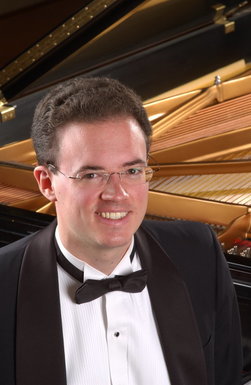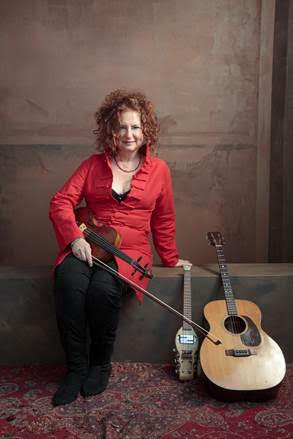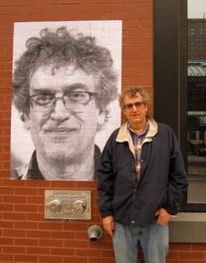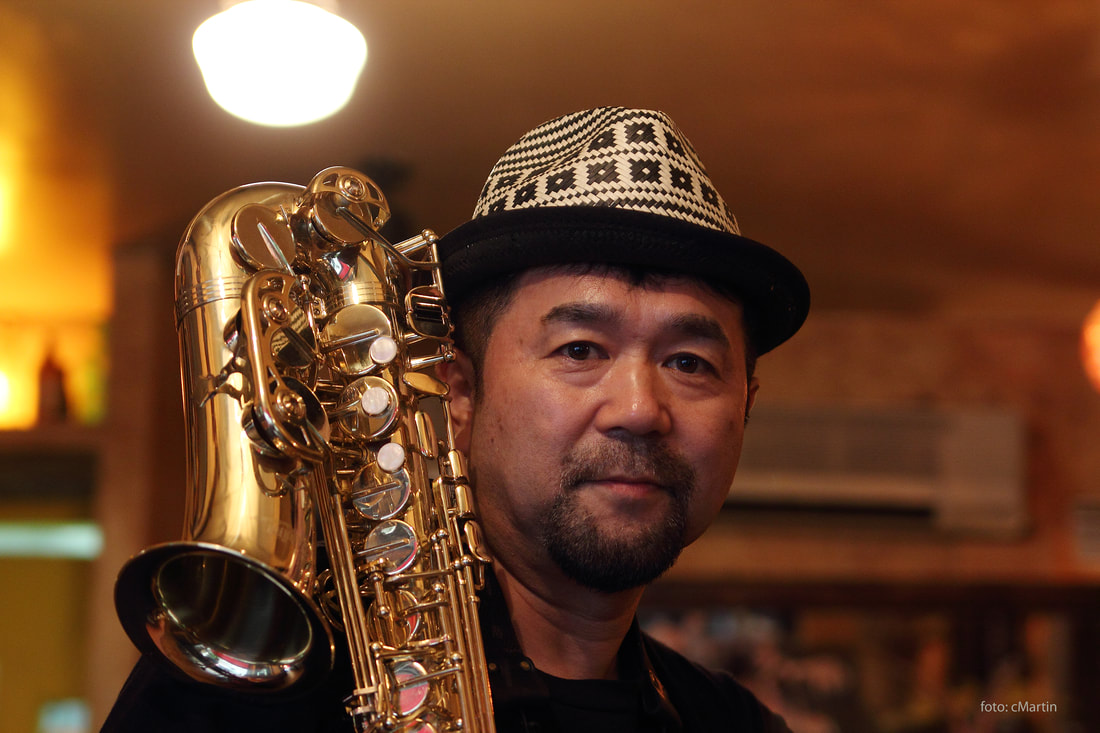
Let me begin by describing the program of new works. I know and have worked with all these composers.
I am opening with "torn" by Evan Chambers. Evan is on our composition faculty at Michigan. This piece was one of a group of compositions commissioned to commemorate the early passing of William Albright, a brilliant composer and a mentor and friend of Chambers, among others. Albright had a Jekyll-and-Hyde-like personality; he could be very sweet, caring and warm, but he could also be irrational, confrontational, and nasty. Especially in his later years, he descended into alcoholism, which may have caused, and certainly exacerbated this split personality. This extremely violent piece, with a heart-rending middle section, is quite vivid in depicting both this torn personality, and our attempts to deal with his life or his premature death. I promise that this piece will get everyone's attention!
The next pieces are a group of miniatures by English composer Marcus Blunt. Marcus and I met digitally (though not yet in person) through our mutual interest in Scriabin, and the many elements of Scriabin's harmonic language. It uses the piano's resonance in an attractive way. The fantasy on the name of Gabriel Fauré takes as a melodic line the musical letters of Fauré's name. It's one of several Blunt compositions governed by this principle. Both it and the Nocturnes have their moments of drama, but they will be heard in this program as a lyrical counterpart to the Chambers opening salvo. These are my first performances of Blunt's music.
Jennifer Higdon's Notes of Gratitude was commissioned for a concert "Notes of Thanks" on the occasion of Linda Reichert's retirement from many years of directing Philadelphia's distinguished "Network for New Music" ensemble. Reichert was among the first to commission Higdon (and numerous other commissions were to follow). This relationship could be seen as the beginning of Higdon's distinguished career. In "Notes of Gratitude" the piano is divided into two instruments, one sounding conventional, resonant triadic sounds, and second giving a percussive sound given by stopped notes in the middle register. The piece has an aura of festivity and also one of sadness, reflecting that this chapter has come to a close. I gave the premiere of the work last April and will not forget the lively time we spent working on the piece.
Ron Thomas is a distinguished Classical and jazz pianist, and Classical and jazz composer, teacher and improviser from the Philadelphia area. His Classical training led to training under Stockhausen, but Thomas found a new direction in his encounter with Bill Evans, Miles Davis, and the jazz tradition. These Five Pieces for Piano are attractive pieces written in the manner of late-Romantic piano miniatures as by Brahms or Liszt, with some crossing into a popular idiom. In a number of these pieces, Thomas delights in exploring the tensions between chromatic voices, leading us to ever unexpected tonal regions. The conclusions of these pieces arise from their harmonic and dramatic logic, but they typically come as surprises nonetheless.
Chiayu Hsu is a Taiwanese-American composer on the faculty at the University of Wisconsin, Eau Claire. I heard her Rhapsody-Toccata on an extraordinary recording at the International Conference of the College Music Society in Sydney, Australia. The performance was effective, but since the recording suffered from poor audio, I was interested to take up the piece, so I could give an audience a live experience of the work in the danger of live performance (and live performance IS dangerous in this piece!). The piece is an attempt to combine two pianistic virtuoso styles: the brilliant, fast-driving toccata style, and the Gershwinesque free, rhapsodic style. The piece is a great deal of fun and full of charm, even a little quixotic, but it is also extremely difficult. It will bring this part of the recital to an exciting close!
I learned the Debussy Preludes Book II as part of a semester's focus on Debussy at Michigan. I'll be playing this set at three other venues this fall. Debussy is likely the most important father of 20th and 21st century musical styles, always questioning traditions and exploring many fresh new ideas. He made possible many stylistic breakthroughs. This second book of Preludes represented a turn towards his later style, in which his more familiar "Impressionism" meets the Stravinsky style of Petrushka. There are various threads of connection one might find between Debussy and the other part of the recital. For example, there are the crosses between traditional art music and vernacular music, such as we find in Chambers, Thomas and Hsu in particular. In just this collection of Preludes, Debussy borrows from cakewalk in "General Lavine" and from the habanera in "La Puerta del Vino." He quotes excerpts from a Brahms Liebeslieder Waltz, from "The Rite of Spring," from a children's song "Au clair de la lune," from "God Save the Queen," and even the "Marseillaise." Debussy perfected the art of the inconclusive ending, reflecting the symbolist's credo of suggesting and evoking, rather than explicitly describing. You can hear the influence in Blunt and Thomas especially.
You are composer in addition to being a pianist. How does your work as a composer inform your compositions, and how does your experience as a performer inform your composing?
I am no longer an active composer, but from my experience, I understand the struggle to notate on paper the kind of gesture one makes on the piano. Notation can't capture all the nuances of a musical performance. Composers usually want us performers to respect and examine, and then go beyond the notation to create something fresh. I especially enjoy the opportunity to work with composers, as I have on this program. I like the opportunity to engage with them about what they are trying to achieve in their music. That frees me to go beyond the notation and gives me full confidence to communicate their vision.
Anything else you would like to add about yourself or your concert?
About myself, I would just say that I'm an Assistant Professor at the University of Michigan School of Music, Theatre, and Dance, where I teach courses and seminars in Piano Literature, studio piano, and also historical performance on early keyboard instruments. I'm best known as an interpreter of Scriabin and Szymanowski, and my outside interests include golf, tennis, chess, and go.
MATTHEW BENGTSON
NEW PIANO WORKS & DEBUSSY PRELUDES





 RSS Feed
RSS Feed
